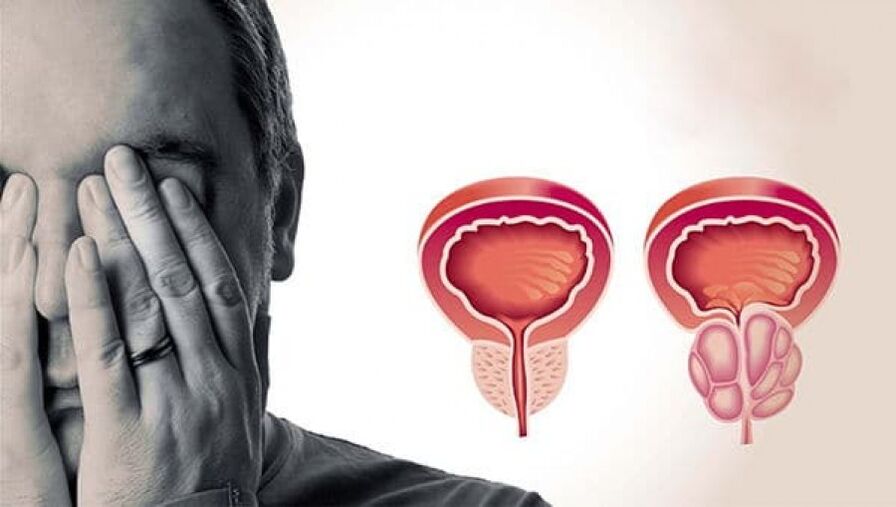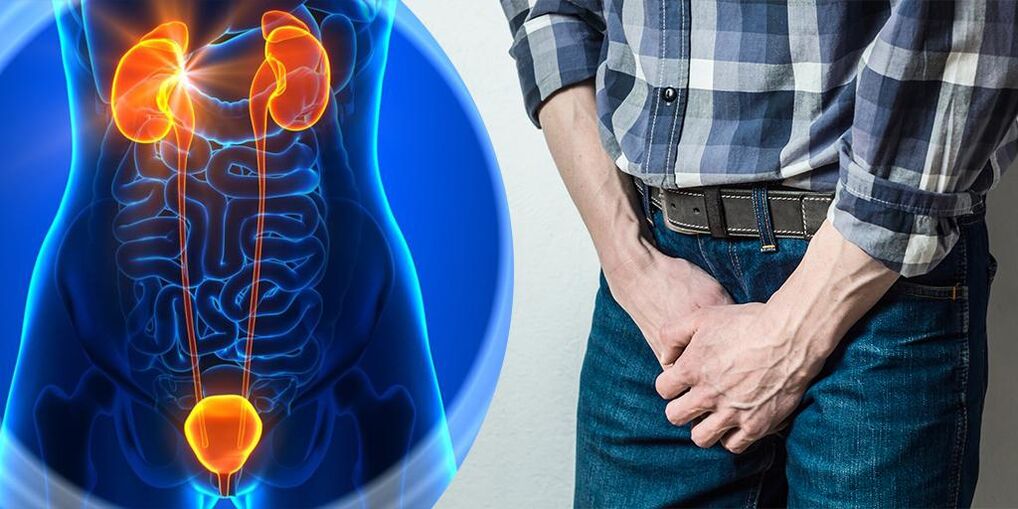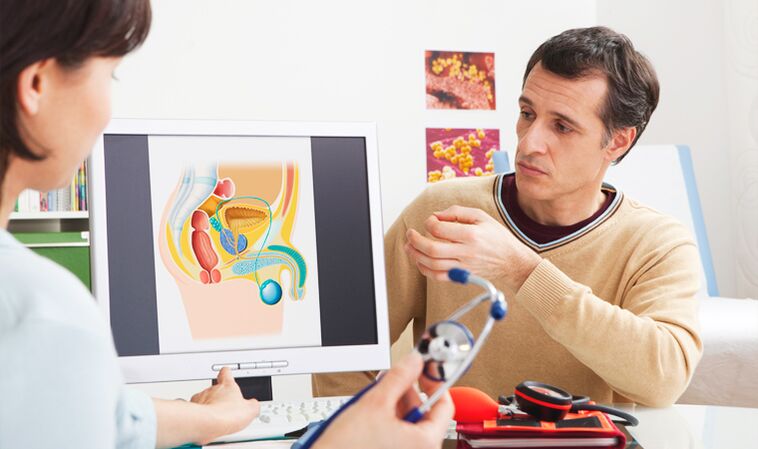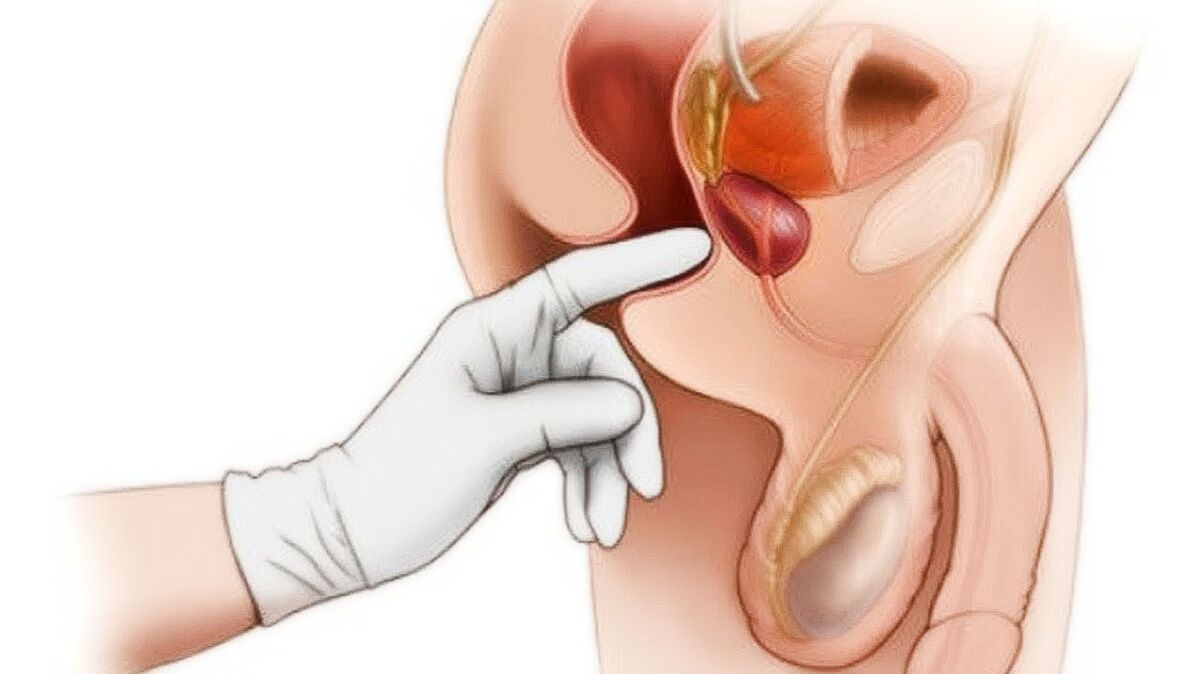More than half of men suffer from prostatitis. The disease is characterized by the development of inflammatory processes in the prostate. The disease is performed in an acute or chronic form. It happens among young people in 20-45 years. However, not everyone knows how prostatitis manifests and why inflammation occurs. The rash attitude towards the disease makes it one of the most common attitudes in men.

Causes of the disease
The inflammatory process in the prostate most often occurs in the context of bacterial infections. There is no exact cause of prostatitis, because the possibility of inflammation in the prostate tissue increases as immunity decreases. The pathogens can be Staphylococcus, E. coli, Enterococcus, Pseudomonas.
These infectious factors are on the mucosa and skin of healthy people, but may lead to the development of the inflammatory process in the event of susceptibility factors:
- Countless sex life: rare sexual contact, interruption of sexual behavior of incomplete ejaculation;
- Low temperature;
- A sedentary lifestyle;
- Stagnation in the pelvic organs;
- Frequent urological diseases, sexually transmitted infections;
- pressure;
- Wearing narrow clothes to squeeze the man's genitals;
- Chronic alcoholism, drugs, chemical drugs;
- crot foot injury;
- Reduce immunity.
The main symptoms of prostatitis depend mainly on the form of the disease (acute, chronic). It is recommended to treat inflammation of the prostate in a timely manner, otherwise the disease will be delayed and will recur regularly. Therefore, everyone should know how prostatitis begins and what signs you should be aware of first.
Causes of chronic prostatitis
Chronic prostatitis develops in the context of acute prostate inflammation. During the relief period, the man was worried about weak perineal pain, which was exacerbated in urination, bowel movements and intimacy. The secondary secretions in the urethra may experience stress.
The causes of chronic prostatitis may be caused by any factors: stress, forced restriction of emptying the rectum or bladder, wearing narrow lower flax, floor infection. During the aggravation, pathological characteristics can only be slightly increased, manifested in increased body temperature and insignificant high temperatures. Men with chronic prostate inflammation are frequently recurred by the disease. As a cause of disease development, even short-term stagnation in the pelvis can work.
Forms and symptoms of acute prostatitis
Signs of prostatitis in men will depend on the form of the disease. Acute inflammation in the glands mainly occurs. The disease comes in three forms: Katahar, follicle and parenchymal. The latter is the hardest. Men usually don’t know the symptoms of prostatitis and talk about the beginning of the inflammatory process.
So, should you pay special attention to the signs of prostatitis? The initial manifestations of the disease:
- Pain in the perineum and pubic bone;
- Discomfort in urine, after intimate contact;
- Broken, weak;
- The temperature increased slightly.
The Katahar stage of prostatitis is considered the easiest, but it is still a taboo at home. Treatment can lead to the development of chronic inflammatory processes. If you do not consult with your doctor in advance, you cannot use the therapist or acquaintance tip because as the most effective and correct treatment, the urologist can prescribe it.
Leaf-like inflammation is more acute. Strong pain occurs in the crot and penis, and unpleasant sensations can cover the entire waist area. This form of prostatitis is the main characteristic of painful pain in men, which does not allow complete clearance of the rectum and bladder. In the context of this type of prostatitis, acute urinary rate develops and the patient's quality is disturbed. With premature treatment, the disease can move to the next stage - parenchymal.

Substantial disease
Symptoms of prostatitis in parenchymal men:
- Severe condition of the patient;
- At the beginning of the disease, rapid urination quickly transfers to urination (completely retained);
- The appetite will decrease and the patient will desire to torture.
- Flavor, intestines cannot be cleared due to severe pain;
- Mucus discharge from the rectum may occur;
- Body temperature rises and stays within 39c.
One of the signs of this severe form of male prostatitis is severe pain in the prostate during detection. At this stage of the inflammatory process, it is difficult to check the patient's palpator due to severe conditions and uncomfortable sensations in the genital area. If qualified treatment does not begin at this stage, the onset of an abscess or the development of a chronic inflammatory process may complicate the disease due to the transition from infection to adjacent organs.
If acute inflammation occurs in the context of urethritis, urethrapathy and other pathological pathology of other urethral organs, then impurities of blood, pus may appear in the urine, and experts will usually find traces of protein. As urine delays, emergency medical treatment is needed. The disease is characterized by an acute onset, starting with a generally good condition and severe pain in the pubic region. Body temperature usually rises. In severe drunken context, joint and muscle pain is possible.
The course of chronic prostatitis
Men do not always go to the hospital when symptoms of chronic prostatitis occur. Pain can be transferred relatively easily and the patient is not in a hurry to consult a urologist. Although the symptoms of chronic prostatitis in men are not as obvious as those in acute inflammation, the disease directly threatens the patient's reproductive and sexual ability. The chronic pathological forms of treatment last longer and, in some cases, even require surgical intervention.
Symptoms of prostatitis in chronic forms of men:
- Pain pain, pain, pain, pain, pain, pain, pain, pain above the pubic bone, tends to increase after sexual intercourse during urination.
- Urination is slightly difficult and intermittent urine flow is the main symptom of chronic prostatitis.
- Appears after working hard or being discharged from the urethra after defecation;
- Impaired sexual function.
In chronic prostatitis, temperatures usually remain normal. But during the aggravation, the emergence of fever syndrome is possible. Typically, a temperature of 37 degrees for prostatitis indicates a slow inflammatory process. It is dangerous enough, especially for men's reproductive health.
Chronic inflammation will feel more likely to proceed, usually manifested only by frequent urine and violation of erection. Recovery is replaced by relapse, but many men do not like to use urologists to treat their own subtle problems, which shows that they are very irresponsible. Even in young people, this disease can lead to infertility, and at older age, prostate cancer can sometimes hide the symptoms of prostatitis.

Diagnostic method
When a man has the first sign of prostatitis, the urologist performs an external examination to explore the prostate through the rectum to determine the size, structure and density of the affected organs. During the palpation process, the doctor should exercise as carefully as possible.
Other diagnostic methods for male prostatitis symptoms:
- Study the secrets of prostate;
- Laboratory diagnosis;
- PCR research;
- Prostate ultrasound;
- Urinary method;
- Magnetic resonance, computed tomography of pelvic organs.
It is recommended to check immediately after signs of prostatitis. This will prevent complications, where erectile dysfunction, hyperplasia and infertility are often found. The study of the causes and symptoms of prostatitis lies in the ability of urologists. For him, even the little sign of prostate disease is worth connecting.
Characteristics of treatment
Many patients make a common mistake - they start using folk therapy, delaying the development of the disease and increasing the risk of complications. Only after identifying the pathogen and determining the true cause of the damaging factor termination of inflammation, treatment options were strictly selected - smoking, adrenal nephritis, erection violation, hypothermia.
Use antiviral drugs to treat inflammation of viral causes. Antibacterial drugs are required for prostatitis caused by chlamydia infection. Pay great attention to strengthening immunity.
Under no circumstances should be treated at home, as it is impossible to treat the disease in an acute form with the help of traditional medicine. The chronic inflammation process requires the intervention of experienced experts. Modern therapeutics allow you to quickly and effectively alleviate the inflammatory process and avoid the development of dangerous complications.
Drug Therapy
The following funds are used to treat inflammation in the prostate:
- antibacterial, antifungal, antibacterial drugs (depending on the cause of disease development);
- Reflux, analgesics;
- Physical therapy methods.
Therefore, urologists recommend contacting your doctor immediately if the first sign of prostatitis occurs. This will win time. Treatment in a simple way at home is strictly prohibited.
Everyone with prostate disease needs effective urology care. Qualified urologists use proven medications and modern treatments. During treatment, it is easy to penetrate into the prostate tissue with antibacterial drugs. During poisoning, special treatments are indicated.
Physical therapy was also used. Current signs of statitis are lifeless, and use it when preventing recurrence. Any technology used by experts should be chosen to take into account the personal characteristics of human health.

Prostate massage
Patients with chronic prostate inflammation undergo gland massage. The procedure should be performed only by experienced experts, as it is a powerful therapeutic agent that can improve the outflow of purulent inflammatory secrets.
Prostate massage refers to complex treatments and diagnostic procedures, performed only by professionals. It is done through the rectum. The organ pipes are massaged with fingers to stimulate blood circulation and secret outflow of the prostate, and research is necessary for many diseases of the genital sphere. Massage releases the duct from the accumulation of pus, eliminating stagnation and reducing the manifestations of the inflammatory process.
Possible complications
If you don't pay attention to the signs and symptoms of prostatitis, it may cause the appearance of blood and pus in other organs in the pelvic area, urine and urine and pus. In a neglected form, the temperature of prostatitis in men increases and the good condition of the well will significantly worsen.
The main complications of prostatitis:
- Vesicles (inflammation of seed bubbles);
- prostate sclerosis;
- prostate abscess;
- prostate cyst;
- Infertility;
- Positive
- Purulent infection of adjacent organs.
Any complication can destroy reproductive function and cause sexual disorders. Chronic inflammation is particularly dangerous. In its context, urethral structures often appear, with reduced mass and quantitative indicators. This threatens future sterility development.
However, the most powerful complication is considered to be the hyperplasia of the gland, with the increased risk of growth of malignant tumors. A person usually doesn't even know the growth of adenomas and cancer tumors until they reach an impressive size and there is no difficulty in urinating.
Preventive measures
Preventing inflammation of the prostate is designed to eliminate the effects of negative external and internal factors. It is recommended to avoid unprotected sexual contact, which can lead to the development of sexually transmitted diseases being complicated by damage to prostate tissue, as well as hypothermia and radial bone effects on the body.
Refuse to over-close your pants and underwear and squeeze your pelvis. The stagnation process in the urogenital organs helps the active reproduction of pathogenic microorganisms, i. e. the development of infectious diseases. It is also important to clear the bladder in time. One of the ways to prevent it is to measure and regularly have sex. Long-term abstinence leads to blood stagnation and causes inflammatory reactions.
The first clinical manifestations of prostate disease make the early attraction of the urologist to allow you to prevent chronic inflammatory processes and dangerous complications. Treating acute prostatitis is easier than dealing with a prolonged disease.























